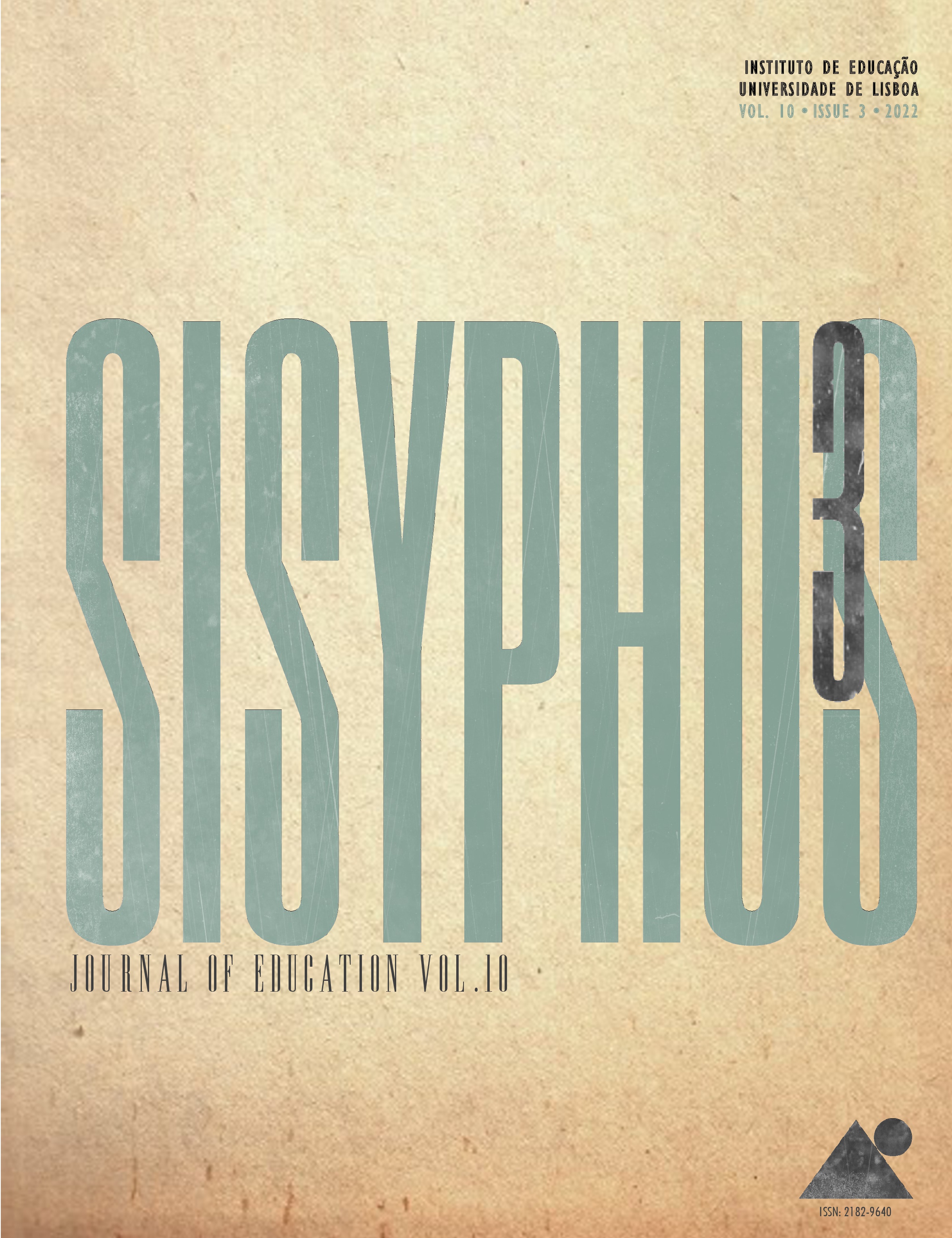“All Hands-on Deck”
Octalysis Framework in Primary English Language Learning
DOI:
https://doi.org/10.25749/sis.26985Keywords:
primary english language learning, octalysis framework, EFL reading and writing, collaborative problem solving, case studyAbstract
Supported by Chou’s Octalysis Framework (2016) in the design of activities, this article investigates how Octalysis framework-based reading and writing activities can be conducive to foster the learning of reading and writing in English as a Foreign Language by primary education pupils in a collaborative project-based learning context.
A case study was carried out in a third-grade classroom in a Portuguese private school. The sessions, developed in face-to-face and online modes, were organized according to pupils’ answers to a questionnaire – to identify their learning preferences. Qualitative data, collected through sessions’ audio and video recordings, pupils’ assignments, group assessments, and cloze tests became the basis of this paper. Results revealed that pupils were motivated and engaged in performing reading and writing tasks, having improved their reading and writing skills, and also promoted the development of social and cognitive soft skills.
Downloads
References
Araújo, I., & Carvalho, A. A. (2018). GAMIFICAÇÃO NO ENSINO: casos bem-sucedidos. Revista Observatório, 4(4), 246-283. doi: 10.20873/uft.2447-4266.2018v4n4p246
Azizi, M., Tkáčová, H., Pavliková, M., & Jenisová, Z. (2020). Extensive Reading and the Writing Ability of EFL Learners: the Effect of Group Work. European Journal of Contemporary Education, 9(4), 726-739. doi: 10.13187/ejced.2020.4.726
Bardin, L. (2018). Análise de Conteúdo. (2nd Edition). Lisboa: Edições 70.
Bell, S. (2010). Project-Based Learning for the 21st Century: Skills for the Future. The Clearing House: A Journal of Educational Strategies, Issues and Ideas, 83(2), 39-43. doi: 10.1080/00098650903505415
Bravo, C., Cravo, A., & Duarte, E. (2015). Metas Curriculares de Inglês Ensino Básico: 1º, 2º e 3º Ciclos. Lisboa: Ministério da Educação. Retrieved from: http://www.dge.mec.pt/portugues
Brewster, J., Elis, G., & Girard, D. (1992). The Primary English Teacher’s Guide. (1st Edition). London: Penguin English Guides.
Cameron, L. (2001). Teaching Languages to Young Learners. (1st Edition). Cambridge: Cambridge University Press.
Chou, Y. (2016). Actionable Gamification: Beyond points, badges and Leaderboards. London: Leanpub.
Costa, A. P., & Amado, J. (2018). Análise de conteúdo suportada por software. Oliveira de Azeméis: Ludomedia.
Coutinho, C. P. (2014). Metodologias de Investigação em Ciências Sociais e Humanas: Teoria e Prática. Coimbra: Edições Almedina.
Daud, D. N. binti, Akmam Din, W., & AlSaqqaf, A. (2018). Exploring The Vaw Method Of Writing Among Esl Primary Pupils: Conceptual Paper. International Journal of Applied Linguistics and English Literature, 7(4), 248. doi: 10.7575/aiac.ijalel.v.7n.4p.248
Fernández-Corbacho, A. (2014). Aprender una segunda lengua desde un enfoque comunicativo experiencial. Programa de Desarrollo Profesional. Editorial Ednumen. Retrieved from: https://robertopedepero.files.wordpress.com/2015/06/anali_fernandez_el_aprendizaje_cominicativo_experiencial.pdf
Figueroa Flores, J. F. (2015). Using Gamification to enhance second language learning. Digital Education Review, 27, 32-54. doi: 10.1344/der.2015.27.32-54
He, Q., von Davier, M., Greiff, S., Steinhauer, E. W., & Borysewicz, P. B. (2017). Collaborative Problem Solving Measures in the Programme for International Student Assessment (PISA). April, 95-111. doi: 10.1007/978-3-319-33261-1_7
Ministério da Educação. (2018). Aprendizagens Essenciais|Articulação com o Perfil dos Alunos: inglês 3º ano. Ministério da Educação. Retrieved from: http://www.dge.mec.pt/sites/default/files/Curriculo/Aprendizagens_Essenciais/1_ciclo/ingles_1c_3a_ff.pdf
Mo, J. (2017). Collaborative problem solving. PISA in Focus, 78 Éditions OCDE. doi: 10.1787/cdae6d2e-en
Nunan, D. (2015). Teaching English to speakers of other languages: An introduction. (1st Edition). New York and London: Routledge.
OCDE. (2003). Cadre d’évaluation de PISA 2003 (Programme international pour le suivi des acquis des élèves). In Assemblage. OCDE Publishing. Retrieved from: https://www.oecd.org/education/school/programmeforinternationalstudentassessmentpisa/33694924.pdf
OECD. (2011). Skills for Innovation and Research. OECD Publishing. doi: 10.1787/9789264097490-en
OECD. (2017a). Pisa 2015 collaborative problem-solving framework. OECD Publishing. Retrieved from: https://www.oecd.org/pisa/pisaproducts/Draft%20PISA%202015%20Collaborative%20Problem%20Solving%20Framework%20.pdf
OECD. (2017b). PISA 2015 Results (Volume V): Collaborative Problem Solving, PISA: Vol. V. OECD Publishing. doi: 10.1787/9789264285521-en
Pinter, A. (2017). Teaching Young Language Learners. (2nd Edition). Oxford: Oxford University Press.
Spanou, S., & Zafiri, M.-N. (2019). Teaching Reading and Writing Skills to Young Learners in English as a Foreign Language Using Blogs: A Case Study. Journal of Language and Cultural Education, 7(2), 1-20. doi: 10.2478/jolace-2019-0009
Torres, S; Lauder, N., & Shipton, P. (2012). Young Explorers, class book 1. Oxford: Oxford University Press.
Yanti, E., & Amti, Z. (2013). The integration of reading and writing by using muddle words game for young learners. Journal of English Language Teaching, 2(1), 59-64. doi: 10.24036/jelt.v2i1.2589
Yavuz, E., & Atar, H. Y. (2020). An Examination of Turkish Students’ PISA 2015 Collaborative Problem-Solving Competencies. International Journal of Assessment Tools in Education, 7(4), 588-606. doi: 10.21449/ijate.682103
Yin, R. K. (2001). Estudo de caso: planejamento e métodos. (2nd Edition). Porto Alegre: Bookman.
Downloads
Published
Issue
Section
License
Copyright (c) 2022 Sisyphus — Journal of Education

This work is licensed under a Creative Commons Attribution-NonCommercial 4.0 International License.
Copyright (c) belongs to Sisyphus - Journal of Education. However, we encourage issued articles to be published elsewhere, provided that Sisyphus authorization is asked for and that authors integrate our original source citation and a link to our website.
Author Self-Archiving Policy
Author(s) are permitted to self-archive the final published version in institutional or thematic repositories, and in their personal or institutional websites.
DORA Signer
The Instituto de Educação da Universidade de Lisboa, Sisyphus' Publisher, is a San Francisco Declaration on Research Assessment signer.






